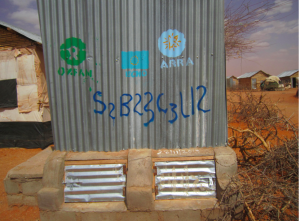Shaping the future: Our strategy for research and innovation in humanitarian response.

Shaping the future: Our strategy for research and innovation in humanitarian response.

Urine-diversion dry toilets (UDDTs) are a type of sanitation system designed for dry excreta management. In these above-ground systems, urine is diverted at the squat plate and feces is collected below in one or two (alternating) vaults. In the two vault system, one vault is in-use or ‘active’ at a time, while the other ‘closed’ vault stores and inactivates pathogens in the waste, primarily via desiccation, over a time period of six to 12-months. While these toilets are often described as an ecological sanitation or ‘ecosan’ system, excreta reuse is not necessarily a design goal for UDDTs. Instead, they are often used as an alternative, on-site sanitation option in areas where traditional below-ground options, such as pit latrines, are impractical due to difficult soil/ground conditions, flooding, or lack of space.

Urine diversion dry toilet in Hiloweyn camp, Dollo Ado
This report provided valuable insight into the acceptability and performance of a large UDDT program implemented in a humanitarian context in Ethiopia, several years into the program and after considerable scale-up in Hiloweyn camp, Dollo Ado. The evaluation was implemented over more than a two-year period, allowing documentation of real field conditions over time including stored waste characteristics, toilet infrastructure, and overall user experience. Given that the program was several years into scale-up and therefore may have had stronger management and oversight than other locations, it is recommended that additional evaluations are undertaken in 1) more temperate and humid environments, 2) different cultural settings, and 3) earlier in implementation phase in an emergency setting. This may assist with developing guidance around a range of appropriate settings and conditions for UDDT use in humanitarian contexts. A number of lessons learned were documented from this evaluation, which may assist implementers in Dollo Ado and elsewhere – both in humanitarian and non-humanitarian settings.

 Please upgrade your browser
Please upgrade your browser
You are seeing this because you are using a browser that is not supported. The Elrha website is built using modern technology and standards. We recommend upgrading your browser with one of the following to properly view our website:
Windows MacPlease note that this is not an exhaustive list of browsers. We also do not intend to recommend a particular manufacturer's browser over another's; only to suggest upgrading to a browser version that is compliant with current standards to give you the best and most secure browsing experience.